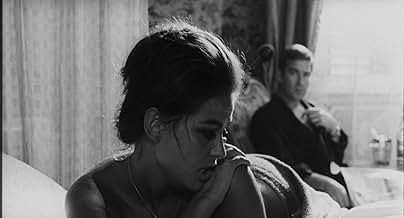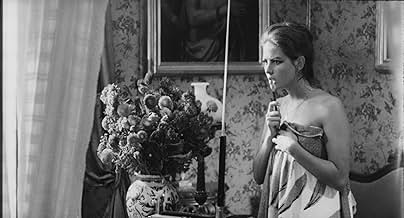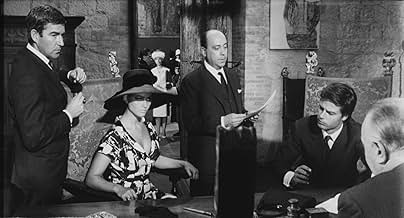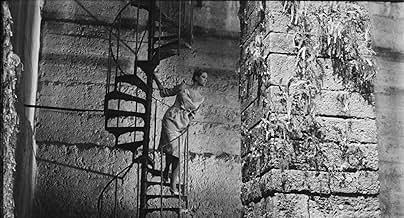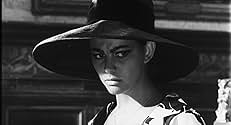Añade un argumento en tu idiomaSandra returns to her childhood village to take care of family business, but her childhood memories and secrets soon overcome her.Sandra returns to her childhood village to take care of family business, but her childhood memories and secrets soon overcome her.Sandra returns to her childhood village to take care of family business, but her childhood memories and secrets soon overcome her.
- Dirección
- Guión
- Reparto principal
- Premios
- 3 premios y 2 nominaciones en total
- Party Guest
- (sin acreditar)
- Party Guest
- (sin acreditar)
Reseñas destacadas
Luchino Visconti's Sandra (1965), is a puzzling but splendorous visual treat that depicts incest, homo-eroticism, madness and collaboration with the Nazis. Its fairly slow pacing and reluctance to make obvious useful information will challenge those who spend hours a day gazing down at their QWERTY devices. However, "Sandra" is very rich and satisfying; it is flawlessly served up by the great Visconti. (I like it more than "The Leopard.")
A modernized retelling of the Greek myth Electra, an attractive, upper-class, socialite couple (Claudia Cardinale in the eponymous role, Michael Craig as her husband Andrew) return to the mansion of Sandra's youth (which she was forced to flee), to attend a small ceremony honoring her father, who was murdered by the Nazis at a concentration camp. When she is reunited with her unstable brother, Gianni (Jean Sorel), the physical connection between them is made very obvious. Their closer-than-normal relationship is never a secret to the audience, but revealing it is a big concern to Andrew and other observers, such as Sandra's barrister stepfather Gilardini (Renzo Ricci). The perpetually nervous Gilardini and Sandra's clinically insane mother (Marie Bell) may also have collaborated with the Nazis by betraying Sandra's father, creating an unusual conflict of pairs.
Shot in high-contrast Black and White, Visconti's skill at shooting his photogenic cast in tight quarters is evident. Because the English translation of the film is somewhat talky, it helps to develop the skill of quickly reading the subtitles in order to enjoy Visconti's work. It is amazing how precise and detailed the imagery is. The scenes between the anguished brother and steely sister are frequently filled with erotic tension. Visconti's trademark homo-eroticism is also present, but to a smaller degree.
One of the more interesting characters is Sandra's "first love" who is now a physician. He seems to personify not just a mixture of Sandra's husband and her brother, but also the Nazi collaborator Gilardini. At least, that's my interpretation of the final image.
Visconti's depiction of a decaying aristocratic family has great depth, and fans of the great director will not be disappointed with it.
The unknown "Vaghe Stelle dell'Orsa..." is another great movie of this artist called Luchino Visconti. The plot about incestuous relationship and family issues in the hands of another director could have become a melodramatic soap-opera. But Visconti explores the sensuality and beauty of Claudia Cardinale to deliver an intriguing and quite erotic family drama without any redemption. The set decoration, as usual, is another piece of art, supported by a classy music score. My vote is eight.
Title (Brazil): Not Available
Here, Andrew (the outsider) is an interesting character. Innocently, (without receiving an oracle!), he analyzes 'the curse' of the dead father rationally, objectively and very ordinarily in vain and opens Pandora's box with his 'good' foolhardiness. Besides, he judges Gianni according to 'his' ethics as a total stranger and raises his fist against his brother-in-law. And still he is never involved in the mythology and should walk away forever. Is he an incarnation of our prosaic civilization of today? The establishment that he is an American (who has a camera!) could be an irony in Visconti's own way?
By the way, recently I watched Desperate Housewives, season 2, Episode 9, "That's Good, That's Bad", and suddenly I remembered the scene in which Gianni takes out the pills and threatens Sandra : George who took the pills menaces Bree ... (so I'm writing this comment now, but I know it's an exaggerated analogy, anyway....)
Jean Sorel is heavenly beautiful. The scene in the water tower takes my breath away. César Franck's music suits the aestheticism of the director, too.
If you are an amateur of Visconti's works, you might know this one doesn't end just as in the original script. Do you think Sandra flies across the ocean to join Andrew or she buries herself in her destined blood there eternally?
Including Mourning Becomes Electra, it could be interesting to refer to also : 1. Les Enfants terribles / Jean-Pierre Melville (1950) 2. Höhenfeuer /Fredi M. Murer (1985) 3. Jeux d'artifices / Virginie Thévenet (1987) 4. La Banyera / Jesús Garay (1989 / fantastic!)
¿Sabías que...?
- CuriosidadesOne of the first films in which Claudia Cardinale, who was born in Tunisia and whose first language was French, dubbed herself in Italian.
- Citas
Gianni Wald-Luzzati: Why can't you be honest for once? Did God tell you to become a nun? Did he tell you to get married and that would satisfy you? Did he tell you that nun's are sick with desire and frustration? That they're willing to mortify their flesh? Now, why must you torment yourself? Why should you fill so full of guilt? So wretched and alone?
- ConexionesFeatured in Visconti (1967)
- Banda sonoraPrelude, chorale and fugue
Written by César Franck
Selecciones populares
- How long is Sandra?Con tecnología de Alexa
Detalles
- Fecha de lanzamiento
- Países de origen
- Sitio oficial
- Idiomas
- Títulos en diferentes países
- Drage zvezde Velikog medveda
- Localizaciones del rodaje
- Geneva, Canton de Genève, Suiza(opening sequence: party at Sandra and Andrew's apartment)
- Empresas productoras
- Ver más compañías en los créditos en IMDbPro
Taquilla
- Recaudación en todo el mundo
- 927 US$
- Duración1 hora 45 minutos
- Color
- Mezcla de sonido
- Relación de aspecto
- 1.66 : 1
Contribuir a esta página


